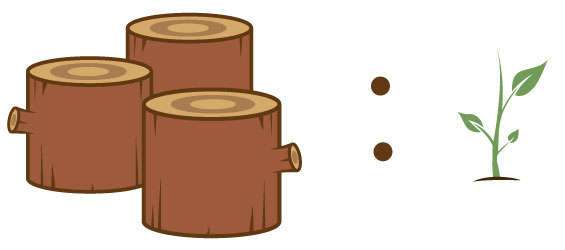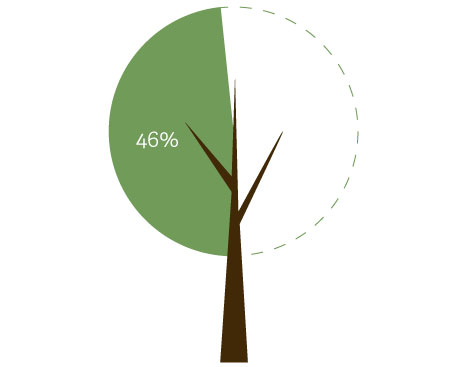How many trees shall we fell before they are all gone?

Afforestation is the new buzzword in environmental policy. Everyone seems to want to plant a sapling. To clear any forest for industrial projects, it is necessary to plant more trees somewhere else.
But a recent global study shows that such efforts just don't add up. In fact, we have missed the mark by a long shot - for every three trees cut down, we are planting just one. At this rate, there may be no trees left in just three centuries. According to the research:
- That's the total number of trees in the world - 422 trees per person
- or nearly half the trees are in tropical forests. A quarter are in the picturesque Boreal forests around the Arctic Circle
- trees are cut each year. But only about 5 billion trees are planted. So the world loses 10 billion trees every year - about 2 per person

Illustration: ICD/Catch News
- is the the number of years our trees will last at the current rate. Planting more trees will defer the deadline
- trees have been planted around the world over five years, under the United Nations' 'Plant A Billion Trees' campaign. That's 2.6 billion trees a year, but we need 15 billion
- trees have been cut down since the dawn of the human civilisation 12,000 years ago
- The study was conducted by scholars at Yale University, and published on 2 September in Nature. The research adopted a new technique to count trees

Illustration: ICD/Catch News
- Previous studies had analysed only satellite images. This one additionally made measurements from 4.3 lakh forests in over 50 countries, making this the most extensive study on trees so far
- See this video from Nature for more







![BJP's Kapil Mishra recreates Shankar Mahadevan’s ‘Breathless’ song to highlight Delhi pollution [WATCH] BJP's Kapil Mishra recreates Shankar Mahadevan’s ‘Breathless’ song to highlight Delhi pollution [WATCH]](https://images.catchnews.com/upload/2022/11/03/kapil-mishra_240884_300x172.png)

![Anupam Kher shares pictures of his toned body on 67th birthday [MUST SEE] Anupam Kher shares pictures of his toned body on 67th birthday [MUST SEE]](https://images.catchnews.com/upload/2022/03/07/Anupam_kher_231145_300x172.jpg)






